[Editor's note: The author of this post is working with @Verdade on this project]
Wider access to mobile technology throughout Mozambique is enabling a national network of citizen reporters to monitor the electoral process leading to the African country's municipal elections in November 2013.
Collaborations between advocacy and media organizations are providing online platforms for people to report problems as well as successes in the run-up to the fall vote. During the country's two-month-long voter registration coming to a close at the end of July 2013, Mozambicans grabbed their mobile phones to send stories and reports from throughout the vast territory.
Mozambicans who are planning to vote in the elections on November 20 had from May 25 to July 23 to get a new voter ID card. A reported 85 percent [pt] of the 3,598,003 eligible voters received theirs during that period, and turnout considerably increased in the last days throughout the more than 2,000 voter registration posts spread around the 53 municipalities that are going to the polls this year.
As expected, the first phase of the electoral process met quite a few technical, structural and human challenges. Hundreds if not thousands of reports were gathered in a liveblog Recenseamento ao Minuto (Registration up to the minute) [pt] on the website of newspaper @Verdade, the most read newspaper in the country.
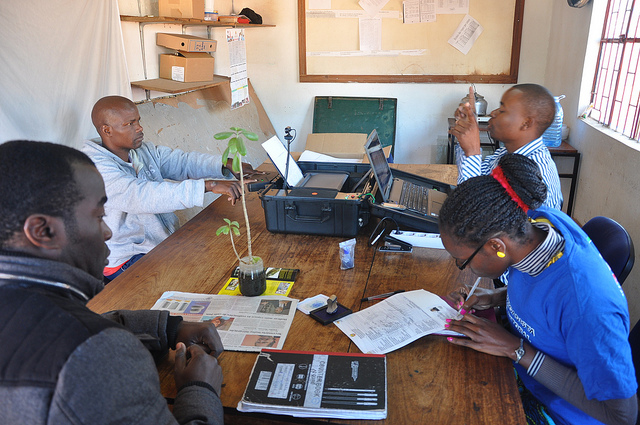
“In the last day of the electoral registration process (July 23), at the primary school of Albazine in Maputo, the process is running smoothly”. Photo by Miguel Mangueze shared by @Verdade on Flickr (CC BY 2.0)
Reports, such as that of Nazarete Reginaldo, an observer in Beira, were included. Reginaldo took stock [pt] of the previous 60 days when the registration process finished:
primeiro os aspectos negativos constatados avaria constante das maquinas desde o momento inicial ate ao fim, isso em quase todos os postos observados.
O segundo aspecto, que também aconteceu em todos postos, foi a rejeição de outros documentos como Cédula Pessoal, antigos cartões de eleitor e presença das duas testemunhas.
A fraca afluência aos postos até a penúltima semana também é outra situação a lamentar.
Outra constatação é de vários postos onde muitos cidadãos não puderam recensear-se no ultimo dia, embora estivessem presentes até a hora prevista do fecho.
Aspectos positivos destaco o não registo de actos de vandalismo com excepção do ultimo dia, na EICB. (…)
Na EPC 12 de outubro os brigadistas sensibilizavam as pessoas de como se portarem no acto do processo. Registaram-se vários cortes constantes de energia que atrasaram o reecnseamento.
first, the negative aspects observed: constant failure of the machines [computers and printers] from the initial moment till the end, that in almost all stations observed.
The second aspect, which also happened in all stations, was the rejection [by the officials] of other [eligible registration] documents such as the Personal Certificate, old voter cards, and the presence of two witnesses.
The low turnout until the penultimate week is also another situation to regret.
Another finding is that there were several posts where many citizens could not register on the last day, although they were present until the expected time of closing.
I highlight the positive aspects of non-registration of acts of vandalism with the exception of the last day, the EICB. (…)
In the Primary School on October 12, officials sensitized people on how to behave in the act of the [registration] process. There were several and constant power cuts which delayed the registration.

Last day of the electoral registration in Nampula, APAE station, July 23. Photo shared by @Verdade on Flickr (CC BY 2.0)
The newspaper is using liveblogging platform Citizendesk, which was awarded by the African News Innovation Challenge in November 2012 and is being developed by Sourcefabric, a non-profit organization that develops open source tools for journalism. Citizendesk gathers different sources such as SMS's, posts from Facebook, tweets, photos, videos, and online content in general, allowing for “newsrooms to incorporate citizen reports into their news stream, to act as eyes and ears for the upcoming elections”, as Rebecca Chao from Personal Democracy's WeGov puts it on her article “Journalists in Mozambique Have a New Way to Get Help Reporting on Elections”.
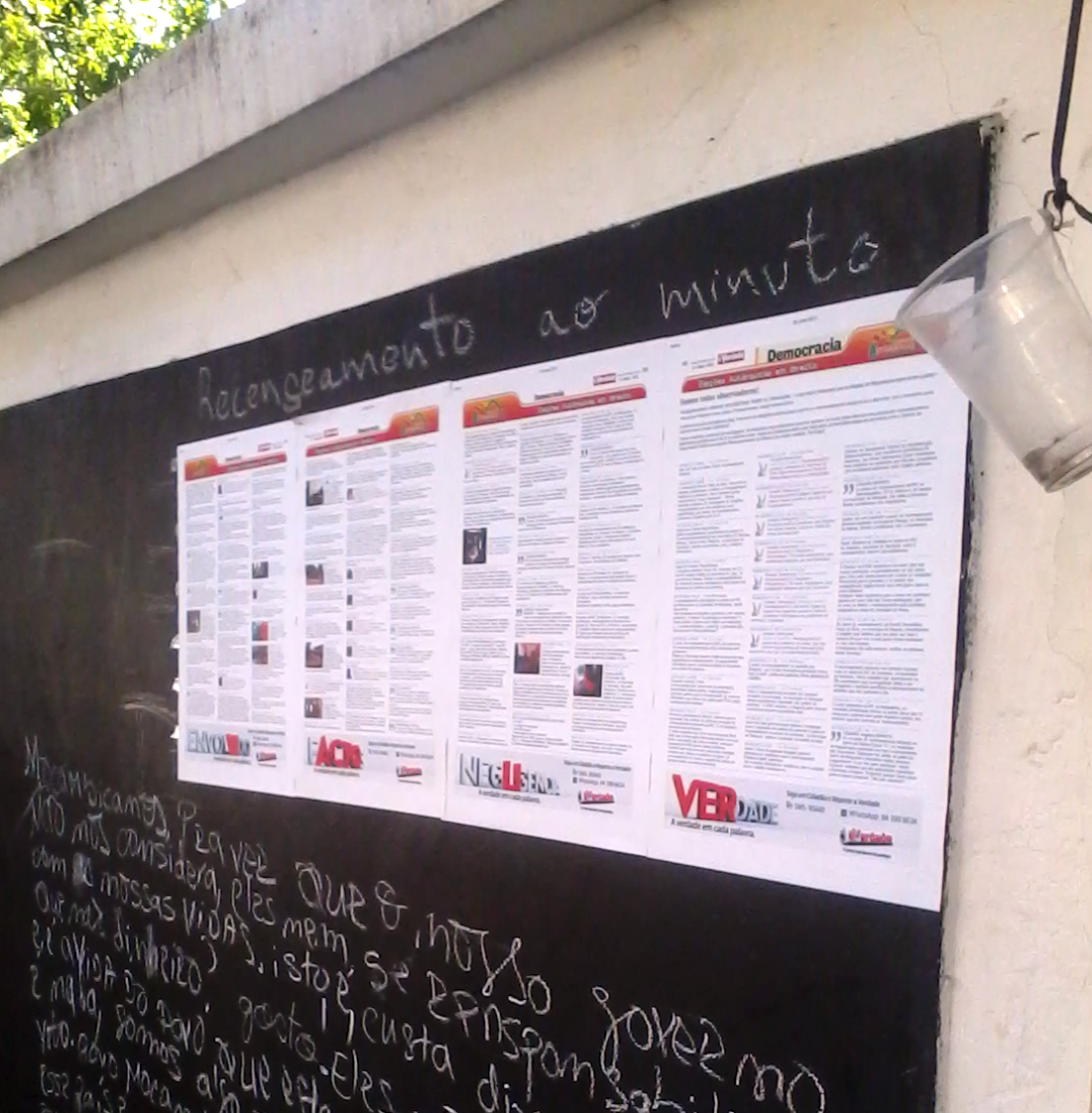
Bridging the digital gap: @Verdade posts a selection of citizen reports about the registration process in its weekly print and also in the outer wall of the building housing the newspaper. Passersby can leave their comments which will later be transcribed online.
@Verdade launched a joint newsroom in the beginning of the registration process, partnering with the Public Integrity Center and the Observatório Eleitoral (Electoral Observer) for broader access, outreach, and coverage of citizen stories from across the country. CIP has correspondents in the municipalities and has long experience covering Mozambican elections mainly through its Political Process Bulletin. Observatório Eleitoral is a watchdog from the civil society that counts on 265 observers spread around the country.
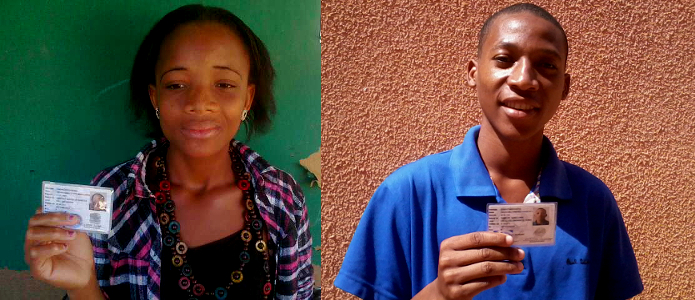
After three days trying to get her voter card, Celina Simão from Nampula was happy when she finally managed to get it at the primary school of Barragem on June 5. Celestino Armando from Pemba got his at the secondary school of Cabo Delgado's capital. Click the image to see @Verdade´s photo albums on Flickr.
The challenge is to create and strengthen a national network of citizen reporters who make use of their mobile phones to share spontaneous reports of what they observe. Jessica Weiss from IJNet explains how @Verdade and partners are building community:
(…) visiting municipalities and polling stations and trying to engage community correspondents. They are also reaching out to local civic networks, community radio stations, international election monitors, taxi drivers and more to help form a web of reliable information about how the registration process is working.
Citizens are helping to answer questions such as: Are polling places open? Are officials present and voters free of intimidation? Is the equipment functioning correctly?
Citizen reporters can submit photos and videos via Twitter — the hashtag #autarquicas2013 has been widely used and the handle @DemocraciaMZ is tracking democracy related tweets — or send them by email directly to @Verdade's Flickr and YouTube channel.
So did André Salmone from the northern city of Nampula, who denounced in a video on July 22 that officials from the registration post in the city's Sports Pavilion were allegedly taking bribes from people who didn't want to wait in queue for their turn to be registered:
Citizens also reported on the civic awareness campaign which was carried out throughout the country by more than 2,000 agents trained by the government's Technical Secretariat for Electoral Administration (STAE). Some criticized the campaign for not being visible, effective, or with enough quality, such as a citizen who reported a photo of STAE's poster in the municipality of Marrupa, which wasn't more than a lousy and torn handwritten paper on the wall.
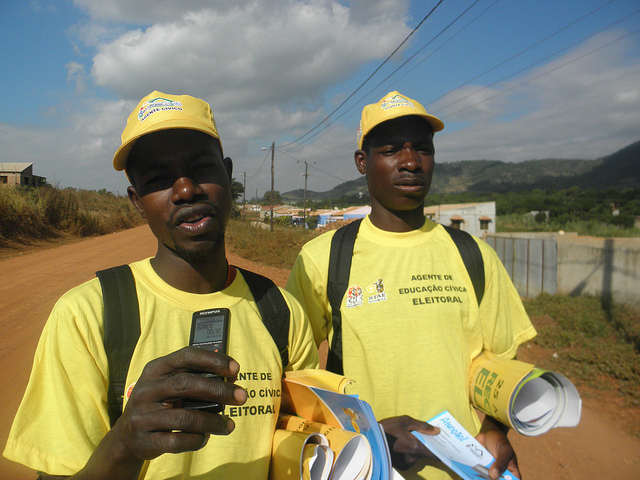
Civic education agents for the electoral registration in the municipality of Catandica on June 6. Photo shared by @Verdade on Flickr (CC BY 2.0)
@Verdade's side website euVoto (I Vote) [pt] gives support to those who want to participate in the “We Are All Observers” campaign by sharing tips, manuals for observers, and laws related to the elections. It also serves as a portal for those who just want to be better informed about the elections. CIP's Political Process Bulletin is there available in the shape of a blog instead of the usual .pdfs.
The next phase [pt] of 2013's electoral process in Mozambique, consists of the registration of political parties, coalitions of parties or groups of citizens who want to run for elections (ongoing until August 6). At the same time, the lists of voters who registered in the 53 municipalities will be available for verification and complaints should there be any irregularity, also until August 6. More and more, Mozambican citizens are showing how to keep the process accountable.

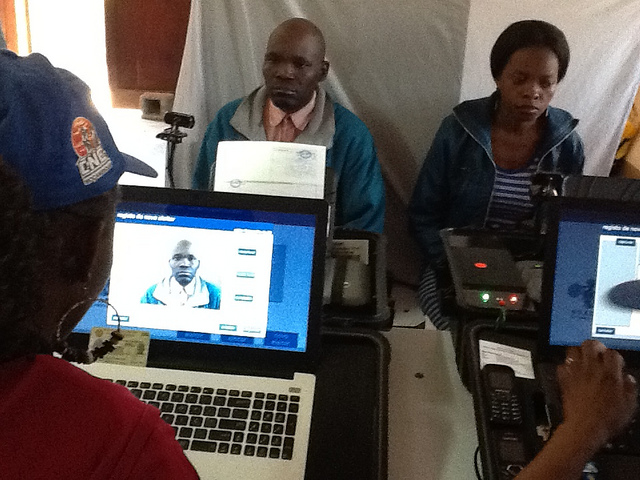
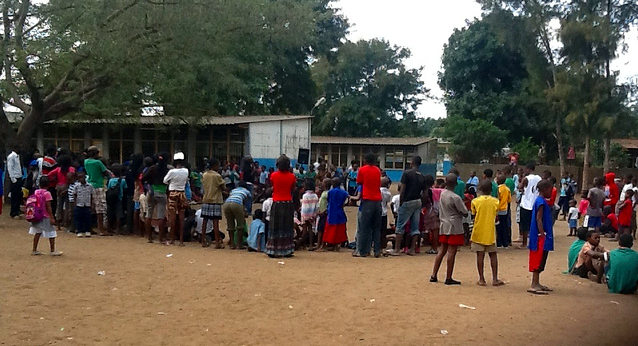






14 comments